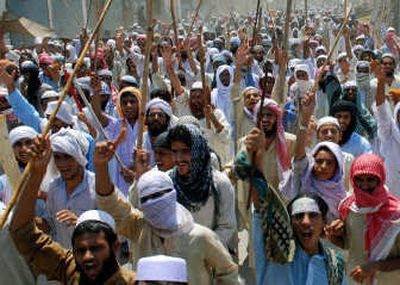Scores die in Pakistan mosque

ISLAMABAD, Pakistan – A commando raid that was expected to be a quick operation to subdue Islamic radicals in the Red Mosque turned into a marathon battle Tuesday and today with elite Pakistani forces sweeping through underground bunkers in more than 20 hours of intense combat.
Military officials said the fighting left at least eight commandos and 60 radicals dead – including the firebrand cleric at the center of the standoff – but they also suggested the toll might ultimately prove far higher. Among the hundreds of people estimated to be in the mosque when the raid began, only 83 made it out alive, most of them women and children.
Authorities had released no information about the fate of the others as of this morning, and reporters were barred from visiting hospitals. Many of the missing were believed to be civilians who had been held hostage.
The Pakistani government and the mosque’s pro-Taliban leadership had been locked in a standoff for eight days after a street clash July 3 that left more than 20 people dead. Mosque leaders had been provoking the government for months by abducting alleged prostitutes and police officers, and by threatening music store owners. The mosque’s clerics, a pair of brothers, said they wanted to create a theocracy in Pakistan based on Islamic law.
For months, President Pervez Musharraf has faced pressure to shut down the mosque, but his government resisted because of concerns that a raid could trigger outrage among religious hard-liners. On Tuesday, there was evidence that a backlash had already begun. In the North-West Frontier Province, bands of armed young men shut down a major highway, and religious leaders called for demonstrations elsewhere.
Pakistani officials acknowledged they had been surprised by the stiff resistance the commandos faced from the radicals, who used machine guns, rocket launchers, gasoline bombs and land mines to fend off the assault.
For much of Tuesday afternoon and into the evening, the elite commandos fought a subterranean war, feeling their way in the darkness through a nest of booby traps and ambushes as they chased militants through basements and tunnels. Fighting continued at the mosque after midnight.
“There’s been a lot of resistance,” military spokesman Maj. Gen. Waheed Arshad said. “They’re very well-armed, well-trained terrorists.”
Among those confirmed dead was Abdul Rashid Ghazi, the firebrand cleric, who had said repeatedly during the standoff that he wanted to be a martyr. Ghazi was killed in the basement of the complex during a shootout, after having given a series of final interviews to Pakistani TV stations in which he blamed the government for the failure of last-minute peace talks.
Government officials had said almost since the standoff began that raiding the mosque and ridding it of the radicals would be a relatively easy operation. They boasted they could do it in an hour or less but wanted to get women and children out safely before launching an operation.
The raid – code-named Operation Silence – came just after dawn prayers Tuesday, with commandos assaulting the compound from three directions around 4 a.m. Only minutes earlier, a contingent of government-appointed negotiators had been hopeful that the conflict was about to end peacefully.
The negotiating team, which included religious leaders and government officials, had been sent in as part of a last-ditch effort to avoid a raid. Talking with Ghazi first by loudspeaker and then by cell phone, the two sides reached a draft agreement around midnight, and a top government official, Chaudhry Shujaat Hussain, was dispatched to Musharraf’s house in the garrison city of Rawalpindi to discuss it.
He returned three hours later with a new offer that Musharraf said was final. The sticking points were whether Ghazi would be allowed to evade prosecution, and what would happen to foreign militants believed to have been inside the mosque.
When Ghazi did not respond to the revised offer, the negotiating team left and the commandos swooped in.